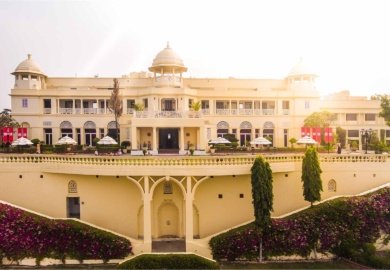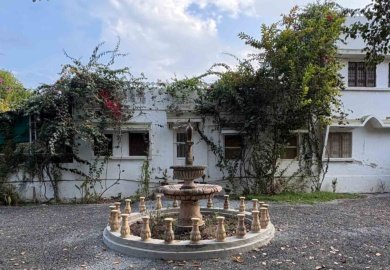The ride into Pushkar that night felt endless. Rajasthan has a way of stretching both time and distance, highways glowing in fragments under truck lights, villages appearing and vanishing like mirages, desert winds carrying the faint scent of smoke and camel dust. I had been riding across Rajasthan all day, tracing roads that blurred into the horizon, chasing a destination that was more feeling than a map pin. By the time the sun dipped, I was still miles away, the sky inked purple, the Aravalli’s becoming shadows of tired guardians.
It was past ten when I finally reached Pushkar. The streets had thinned, but life here doesn’t sleep early. Devotees murmured by the ghats, chai stalls clinked with late-night cups, and drums from a temple carried across the lake like forgotten echoes. Turning off the main street, I followed a quieter road that sloped gently toward the desert. The air shifted thinner, cooler, perfumed faintly with the dryness of sand.
Then, suddenly, it appeared. Dera Masuda rose like a fortress caught between memory and dream. Ochre walls glowed softly in the moonlight, domes stood against the sky like watchful sentinels, and lanterns lit the courtyard in a hush that felt reverent. It didn’t look like a hotel. It looked like an inheritance, something that had always been there, waiting for me to arrive.
As I parked my bike and walked through the gate, exhaustion slipped away, replaced by an unexpected stillness. Staff greeted me not with rehearsed welcomes, but with warmth, the kind that feels inherited rather than taught. Within minutes, my bags were whisked away, and I was led through courtyards alive with the hush of water and the shimmer of the pool reflecting starlight.
The room keys clicked, the door swung open, and the first thing I saw was the horizon. My suite overlooked the pool, beyond which rolled the quiet hills of Pushkar, their outlines soft under the desert night. The air carried no noise, only space. I poured myself a glass of water, stepped onto the balcony, and let the silence press into me.
After hours of riding, the world had finally paused. And in that pause, framed by ochre walls and desert winds, Dera Masuda introduced itself not as a resort, but as a continuation of something older, something deeper.
That night, I didn’t fall asleep. I surrendered.
The Masuda Legacy: A Fort, A Family, A Continuation
To understand Dera Masuda, you need to understand the name itself. Masuda isn’t just a word; it’s a lineage. The Masuda family were jagirdars, rulers of vast lands in Rajasthan, with their seat of power at the Masuda Fort near Ajmer. Built in the 16th century, the fort was more than a home; it was a bulwark, a witness to the shifting fortunes of empire. Mughal armies passed its gates, Rajput alliances were forged and broken within its halls, and through centuries of conflict and change, the fort stood scarred, but unbroken.
The Masuda jagirdars were not only warriors; they were custodians of culture. Their estates hosted festivals, their kitchens defined flavours that would later become synonymous with Rajasthan, and their archives preserved genealogies, poetry, and art. Over time, as the jagirdari system waned and India modernised, the family’s role shifted. No longer rulers, they became stewards, keepers of heritage in an age where memory often yields to convenience.
Dera Masuda Luxury Resort in Pushkar is part of that stewardship. Unlike the fort, it was not built for defence. It was built for hospitality. But hospitality here doesn’t mean service stripped of soul; it means offering guests a portal into Rajasthan’s layered history. By weaving traditional Rajasthani architecture into contemporary design, the Masuda family ensured their legacy wouldn’t sit trapped behind museum glass. Instead, it breathes in the courtyards, in the flicker of diyas, in the arches framing the desert horizon.
Walking through the property, I noticed motifs borrowed from the family’s ancestral fort: carved jaalis that filtered sunlight into patterns, domes that mimicked the skyline of Ajmer, furniture designed to echo the grandeur of old durbars. Yet, there was nothing pretentious about it. It wasn’t heritage recreated for tourists; it was heritage lived, adapted, and translated into modern comfort.
In the dining hall, I saw photographs of ancestors in regal attire, their gazes steady, half-smiling as if amused by modernity. In the library corner, there were books on Rajasthan’s history, some authored by family members themselves. And in the quiet conversations with staff, I heard stories of how this property was envisioned not as a business venture but as a tribute.
Dera Masuda is not a hotel someone decided to build. It is a story someone decided to continue. A story that stretches from the battlements of Ajmer to the courtyards of Pushkar, from war cries to whispered prayers, from heritage to hospitality. And as I sat under the courtyard lanterns that night, sipping chai and listening to the desert’s silence, I realised: I wasn’t just staying at a resort.
I was resting inside history.
A Room With a Horizon
My suite became my sanctuary for two nights. It wasn’t grand in the way palaces overwhelm; it was grand in how it invited you to notice. High ceilings framed the air, marble floors cooled my tired feet, and arches opened like invitations to light. The carved wooden furniture seemed less purchased and more inherited, as if each piece had travelled through time to rest here.
The real luxury, though, was the view. From my balcony, the pool stretched like a mirror, its surface catching both sky and stars. Beyond it, the Pushkar hills rolled gently, their silhouettes shifting with each hour, soft at dawn, gold by afternoon, brooding by dusk. Every time I looked out, the horizon had changed, as if the land was painting itself anew for anyone willing to watch.
The first morning, I woke early, pulled the curtains aside, and let the desert’s dawn spill across the room. The air was crisp, the light tender, and for a moment, I forgot I was in a resort. It felt more like being held in the arms of the landscape itself. Sitting on the balcony with chai, I watched as villagers walked in the distance, carrying bundles of firewood, their silhouettes framed by hills. Pushkar wasn’t performing here. It was simply living.
Inside the room, details continued the narrative. The bed was draped in linen that felt both regal and restful. Lamps glowed with warm amber light, echoing the lanterns in the courtyard. Even the bathroom carried touches of Rajasthan’s intricate tilework, brass fittings, and windows that opened onto the desert breeze.
But what stayed with me wasn’t the décor. It was the feeling of being framed not as a guest in a generic room, but as someone temporarily woven into the fabric of this land. From the poolside loungers, I watched the sky turn pink, then indigo. From the bed, I listened to the wind rustle through courtyards. From the desk, I scribbled notes that felt less like travel writing and more like confessions.
For two nights, this room became not just a shelter but a horizon. A place where the inside mirrored the outside, where comfort carried memory, and where silence wasn’t absence but presence.
The Family’s Presence
Unlike chain hotels that mask identity behind efficiency, Dera Masuda wears its lineage openly. The Masuda family’s presence was everywhere, not just in photographs, but in the ethos of the place. Walking down the corridor, I paused at portraits of ancestors in regal attire, their faces etched with dignity and time. In the lobby, I noticed plaques explaining the family’s role in the region, their transition from jagirdars to modern custodians. Staff often spoke of the family not as distant owners but as active participants. “The recipes are theirs,” one waiter told me. “The design too. Everything here is theirs to keep alive.”
That personal involvement was evident in the hospitality. Staff members addressed me by name, asked about my ride, and remembered my preference for ginger chai without prompting. When I asked about the architecture, a young manager explained how some design elements were borrowed directly from the ancestral fort, while others were softened to create intimacy. “The family didn’t want this place to intimidate,” he said. “They wanted it to invite.”
One evening, sitting in the courtyard as dusk softened the air, I spoke with a senior staff member about the resort’s origins. He told me how the Masuda family envisioned Dera Masuda not just as a business but as a bridge, a way to bring the grandeur of Rajasthan’s past into the rhythms of modern travel. “This is not just a stay,” he said. “It is a memory that continues.”
And he was right. Unlike anonymous hotels, where you remain a guest, here you feel adopted into a lineage. The walls didn’t just hold décor; they held continuity. The staff didn’t just serve meals; they carried stories. Every moment here reminded you that you were inside something larger than yourself, a family’s history translated into hospitality.
It is rare for a hotel to feel personal without losing professionalism. At Dera Masuda, both
coexist. Heritage walks beside service. Memory sits beside modernity. And as a traveller, you are not just accommodated, you are remembered.
Flavours of the Desert
Food at Dera Masuda wasn’t an afterthought. It was a narrative.
The first night, I sat in the dining hall where lanterns glowed, and the air smelled of cumin and smoke. A thali arrived, and it wasn’t curated for performance; it was cooked for belonging—Dal baati churma, smoky and rich. Ker sangri, earthy and resilient, is born from the desert’s scarcity. Laal maas, fiery yet comforting, its spice warming me deeper than the desert chill.
Each dish carried history. The server explained how ker and sangri were once survival foods, foraged in the desert when nothing else grew. Today, they are delicacies, served with pride. Eating them wasn’t just a meal; it was a lesson in resilience, in how landscapes shape cuisine.
Breakfasts were simpler but no less grounding: hot parathas straight off the tawa, steaming masala chai, fruits sweetened by desert air. One morning, a bowl of poha was served with peanuts roasted so perfectly they cracked like little fireworks in the mouth. Another morning brought jalebis crisp, sticky, unapologetically indulgent.
What struck me most was the balance of meals that were neither overwhelmed by fusion nor frozen in time. They carried tradition but respected the modern traveller’s palate. And they were served with a kind of intimacy that made you feel like a guest at a family table rather than a customer at a hotel.
Food, here, was another form of inheritance. Another way the Masuda family carried their history forward was not in stone, but in spice.
Pushkar Outside, Stillness Inside
Pushkar is chaos wrapped in devotion. The ghats echo with chants, the bazaars burst with brassware and textiles, and the Brahma temple hums with pilgrim footsteps. Walking through its lanes is to surrender to sound, colour, and faith.
And yet, each time I returned to Dera Masuda, it felt like stepping into another rhythm. The resort didn’t shut out Pushkar; it simply translated it into stillness. The pool became a second horizon, reflecting both sky and desert—courtyards filled with the music of folk dancers whose anklets echoed stories older than empires. One evening, fire spun into music, swirling like living embers against the desert night.
Camel rides, dune safaris, and curated excursions were offered, but what lingered most wasn’t the planned experiences. It was the silences sitting by the pool as wind rustled through the Aravallis, standing on the balcony as stars thickened across the sky, lying in bed as the desert night folded in.
Inside Dera Masuda, Pushkar’s riot softened into reverie. And that balance of chaos outside, calm within, made the resort not just a retreat but a rhythm.
Heritage in Conversation
The genius of Dera Masuda lies in its ability to negotiate past and present. Where the ancestral fort near Ajmer speaks of grandeur, this resort translates that grandeur into accessibility. Instead of intimidating, it invites. The architecture carries history without fossilising it, jaalis that play with light, arches that frame silence, and courtyards designed for conversation. The hospitality carries dignity without stiffness, staff who know heritage but offer it with warmth. Even the smallest details, such as brass lamps flickering at dusk and the scent of sandalwood rising from corners, feel like dialogues between centuries.
One evening, as desert winds picked up, I asked a staff member if he ever tired of the view. He looked at the horizon and said, “The family built this place for the desert. And the desert never looks the same twice.”
That is the essence of Dera Masuda. It doesn’t freeze heritage into nostalgia. It lets it live, breathe, and change just like the desert outside its walls.
The Last Morning
On my final day, I woke before sunrise. The air was cool, the desert hushed, and the pool still reflected the fading stars. I carried a cup of chai to the balcony and watched as the horizon softened into gold.
In that quiet, I thought about the Masuda lineage, their ancestral fort, their legacy, their decision to create this retreat as a continuation rather than a monument. By staying here, I hadn’t just been a guest; I had been part of a conversation between past and present, between heritage and hospitality.
As I packed my bags and prepared to leave, I glanced back one last time. The ochre walls glowed under the morning sun, the domes rose like promises, and I realised: some hotels are places you check into.
Dera Masuda is a place that checks into you.
| Category | Rating (1–5) | Notes |
|---|---|---|
| Location | ⭐⭐⭐⭐☆ (4.5) | A little away from the main town, which makes it serene. Perfect for slow travelers. |
| Heritage Value | ⭐⭐⭐⭐⭐ (5) | Immersive heritage with real family history woven into every detail. |
| Room Comfort | ⭐⭐⭐⭐☆ (4.5) | Spacious, comfortable, elegant. Balcony views are unmatched. |
| Food & Dining | ⭐⭐⭐⭐⭐ (5) | Authentic Rajasthani cuisine, served with care. Family recipes shine. |
| Hospitality | ⭐⭐⭐⭐⭐ (5) | Warm, personal, and deeply connected to the family legacy. |
| Experiences | ⭐⭐⭐⭐☆ (4.5) | Folk performances, pool, camel rides. Some may want more spa-like luxury, but the authenticity is its strength. |
| Value for Money | ⭐⭐⭐⭐☆ (4.5) | For the experience and heritage, excellent value compared to anonymous luxury chains. |
| Overall | ⭐⭐⭐⭐⭐ (5) | A rare blend of history, hospitality, and stillness the kind of place that lingers. |
Dera Masuda Luxury Resort isn’t just where you stay in Pushkar. It’s where you learn what it means to belong to history, to the desert, to stillness itself.





